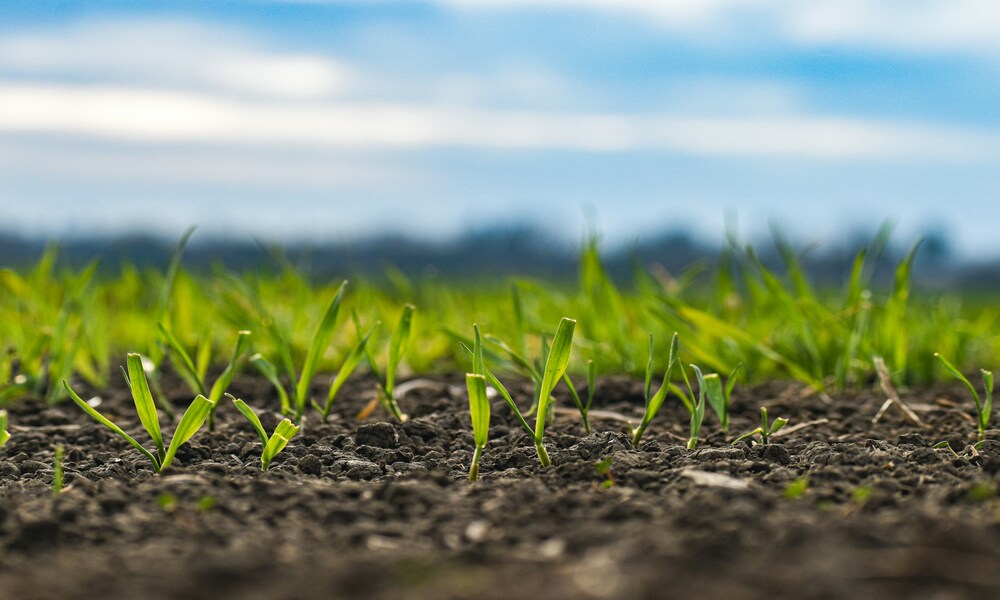After July’s heat wave and early harvest, August did not bring much of a respite from the hot, dry conditions. As a result, the UK is now facing its fifth worst harvest since 1984, as one of the driest springs in a century takes its toll on yields. But it’s not all doom and gloom. New regulations are bringing much-needed fairness to pig farming contracts, while Tesco is following through on its sustainability commitments by rewarding farmers with £9.5 million for hitting green targets. Meanwhile, the Environment Agency is urging farmers to prepare for winter slurry storage, and the Oxford Farming Conference has announced that “Growing Resilience” is the theme for its landmark 90th anniversary in 2026. Enjoy reading our roundup of the stories that have been making the headlines in August.
UK on track for fifth worst harvest since 1984
The consequences of this year’s extreme weather are becoming increasingly clear as new analysis reveals the UK is heading for its fifth worst harvest since detailed records began in 1984. Following one of the driest springs in a century, wheat, oats, and barley yields are significantly down, marking another year of weather-related challenges for farmers.
The Energy & Climate Intelligence Unit’s analysis of AHDB yield estimates also revealed that three of the five worst harvests since records began, 2020, 2024, and now 2025, have all occurred this decade following periods of extreme weather. While the 2024 harvest was blighted by extreme rainfall, fast forward a year and the problem is drought. This is what farming in a changing climate looks like.
The impact extends beyond arable crops. Vegetable growers report much lower production levels for field crops like broccoli and cauliflower, while livestock farmers are struggling to grow sufficient grass for their cattle and sheep. The Bank of England has recently warned that extreme weather globally is contributing to current food price inflation, with concerns that ongoing climate volatility may prevent prices from falling as expected next year.
The analysis adds weight to calls for urgent action on climate resilience, with experts emphasising that farmers need more support to invest in healthier soils and green farming measures that can improve resilience against increasingly frequent weather extremes.
Fair Dealing Obligations (Pigs) Regulations come into force
The pig sector has welcomed a new era of contractual fairness as the Fair Dealing Obligations (Pigs) Regulations 2025 came into effect on August 13th. The landmark legislation mirrors successful rules already operating in the dairy sector and represents a significant step forward in the government’s commitment to creating fairer agricultural supply chains.
Born from extensive consultation with pig farmers, producer groups, and the wider industry, the regulations tackle long-standing issues around contract transparency and fairness that have plagued the sector. The rules apply to pig purchase contracts between purchasers, such as processors and abattoirs, and qualifying sellers, including pig farmers and those who buy pigs without processing them.
The new framework introduces stringent requirements that will reshape how business is conducted across the sector. All new contracts must be written, signed, and include clear terms covering pricing structures, contract duration, termination procedures, and dispute resolution mechanisms. The regulations give pig farmers and producers far greater certainty over their contractual arrangements while protecting them from unfair practices.
Perhaps most significantly, the rules hand producers greater control over how they sell their pigs, addressing power imbalances that have historically favoured large processors. With a 12-month transition period allowing the sector to adapt, all contracts, both new and existing, must meet these new standards by August 13th, 2026.
The move forms part of the government’s broader drive to improve fairness across agricultural supply chains, following successful implementation of similar protections in the dairy sector that have already begun to rebalance relationships between farmers and processors.
Environment Agency urges farmers to prepare for winter slurry storage
The Environment Agency has launched its ‘Winter Ready’ campaign, urging farmers to prepare now for the challenges that winter may bring. Even though across England, rainfall has been well below average so far this year, the campaign aims to remind farmers about the importance of planning ahead, in an era of increasingly volatile weather patterns.
The guidance focuses on practical steps that farmers can take to tackle potential slurry storage issues during the current dry period. Key recommendations include ensuring six months of storage capacity to comply with Farming Rules for Water requirements, which mandate spreading only according to crop and soil need. The Environment Agency also emphasises the importance of covering slurry tanks, lagoons, and pits, while using the summer months to fix drainage systems and clear guttering to ensure proper separation of clean and dirty water.
A key aspect of the guidance addresses the acceptance of additional materials. The Environment Agency warns farmers against taking sludge, digestate, or other materials unless they have immediate need for them, stressing that even contracted arrangements don’t absolve producers of responsibility for proper disposal of bi-products and waste.
For farmers seeking guidance, the Environment Agency has committed to providing support through local officers and a dedicated National Customer Contact Centre hotline.
“Growing Resilience” theme announced for Oxford Farming Conference 2026
The Oxford Farming Conference has announced “Growing Resilience” as a theme for the 2026 event, as it celebrates its landmark 90th anniversary. Under the leadership of new Chairman Jude McCann, CEO of the Farming Community Network, the conference is positioning itself to drive transformational change within UK agriculture and beyond.
The theme for the 2026 event marries a historical perspective with forward-looking ambition. It challenges the sector to learn from previous generations who, in many ways, operated more resilient farming systems characterised by mixed enterprises, higher labour intensity, and less regulatory complexity. Yet rather than advocating for a return to the past, the conference will explore how these lessons can inform future-focused strategies.
Three core themes are on the agenda: people, environment, and business. This approach promises to encompass everything from policy and trade to climate adaptation, family farming structures, production systems, and the adoption of innovation and technology. The conference aims to highlight connectivity, both human and mechanical, while exploring themes like mindset and financial resilience which underpin successful agricultural businesses.
The 2026 event will maintain the Oxford Farming Conference’s prestigious tradition of using Oxford University’s Oxford Union Debating Chamber, where debaters will follow in the footsteps of notable figures including Winston Churchill, Albert Einstein, and Ronald Reagan.
Supporting the conference’s ambitions is the Frank Parkinson Agricultural Trust, which is backing the event for its 25th consecutive year. The Trust will sponsor the OFC report focusing on agriculture’s future opportunities. The report will explore how the sector can evolve into a mission-led, agile, and opportunity-driven industry populated by people ready to embrace future challenges with optimism and adaptability.
Tesco to reward farmers with £9.5M for hitting green targets
Tesco has announced that it will distribute £9.5 million to over 400 British farmers who achieve environmental and animal welfare targets under its supplier schemes. The initiative represents one of the most significant retailer-led sustainability investments in British farming and signals a new era of performance-linked payments for climate-smart agriculture.
The programme spans Tesco’s dairy, beef, lamb, and pig sustainable farming groups, with each sector receiving tailored incentives aligned to specific sustainability metrics. The most substantial element focuses on the 260 dairy farmers in the Tesco Sustainable Dairy Group, who supply milk through Müller UK. They will be eligible for additional payments of up to 2.5p per litre for meeting targets on emissions reduction, animal health, feed conversion efficiency, and genetic improvements.
Beyond the financial incentives, the programme includes a crucial baselining exercise over the next 12 months to establish targets for soil, water, and biodiversity improvements. This approach ensures that environmental gains are measurable and sustainable, moving beyond box-ticking to create genuine ecological benefits.
The initiative extends across Tesco’s other farming groups with tailored approaches. Members of the Tesco Sustainable Lamb Group will receive rewards for planting herbal leys, while the Tesco Sustainable Pig Group will see payments linked to improvements in animal welfare, biodiversity, soil health, and emissions reduction. Incentive payments are already in place for farmers in the Tesco Sustainable Beef Group.
Ashwin Prasad, Tesco UK CEO, emphasised that the move directly responds to farmer priorities identified in the retailer’s recent Greenprint for UK Farming Report. The farmer-led strategy highlighted incentive schemes as crucial tools for meeting shared sustainability goals, prompting Tesco to link payments to measurable progress across its Sustainable Farming Groups. The approach aims to secure both commercial resilience and environmental gains, ensuring farms remain economically and environmentally sustainable for the long term.
Sources:
Energy and Climate Intelligence Unit https://eciu.net/media/press-releases/2025/uk-on-course-for-fifth-worst-harvest-after-drought-hits-staple-crops-new-data
Defra farming blog https://defrafarming.blog.gov.uk/2025/08/06/fairer-supply-chains-supporting-the-pig-sector/
Farming Advice Service newsletter https://www.farmingadviceservice.org.uk/newsletter/august-2025-newsletter
Oxford Farming Conference blog https://www.ofc.org.uk/blog/growing-resilience-positive-future-uk-agriculture
Farming UK https://www.farminguk.com/news/tesco-to-pay-farmers-9-5m-for-hitting-green-targets_67115.html





